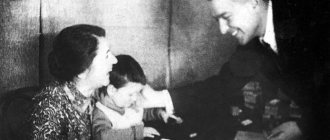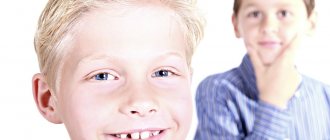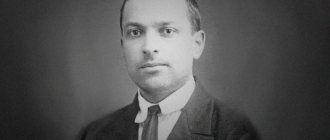Updated July 24, 2021 787 Author: Dmitry Petrov
Hello, dear readers of the KtoNaNovenkogo.ru blog. Every person goes through a process of education that begins from the very first day of his life.
They explain to us what is good and what is bad, teach us useful skills, basic activities, communication and exemplary behavior.
First, this is done by parents, then by kindergarten teachers, and then by school and college. What education is, why it is needed and what it is like is the topic of today’s article.
Basic concepts of educational psychology
In psychology, special concepts and terms are used.
Formation is a process when the formation of a personality occurs under the influence of all factors influencing it. This is a social concept, since upbringing is inextricably linked with the impact of society on the individual.
Development , changes occur in the personality, quantitative and qualitative, in the process of influencing it.
Education , the result obtained in the learning process, the amount of knowledge and skills acquired.
Training is a process that is specifically organized and managed. It is aimed at gaining knowledge, skills and abilities.
Socialization, assimilation of the culture of society, self-realization, development throughout all stages of life.
Education, what is it?
Educationability , the ability and readiness of an individual to respond to influences, to assimilate moral and cultural norms.
This includes readiness to develop new behavioral and cognitive skills, and the ability to learn to control one’s emotions and actions.
Some children respond well to educational influences, there is no need to apply special coercive measures to them, they have good upbringing. Others require a complex approach, the development of individual methods.
Essence and content of the process
The child himself must take part in the process of upbringing , but at the same time, educators influence him on the basis of historically established patterns of behavior. The teacher must help the student go through the path of moral development.
Thus, it is necessary to set up the process so that the teacher leads and at the same time the child himself strives for self-education. This is not adjustment to a standard , but the creation of an independent and developing personality, the formation of values, and independence in decision making.
The formation of social behavior occurs only in a social environment in the process of interaction with other people and culture.
Education is an active process ; two parties are involved in it, the person being educated and the educator. In addition, society takes part, as the environment in which the child develops.
These are not only processes that occur in childhood. Self-education is possible until old age.
Classification
There are several classifications of education. They include different types.
Classification of education:
- On an institutional basis. This includes the main institutions of society: family, educational environment.
- By content. Education can be mental, labor, emotional, physical.
- According to the style of relationship between the student and the teacher. This includes a democratic, authoritarian, free type of education.
- According to the object of education. This includes types such as moral, emotional, civic, and legal education.
Goals and objectives
Education is aimed at:
- Formation of the individual’s attitude to the surrounding world.
- Formation of an individual's attitude towards himself.
- Comprehensive personality development.
- Developing self-awareness.
- Personal self-determination, assistance in this process.
- Moral development.
- Gaining skills to interact with society.
Tasks:
- spiritual unity of generations,
- education of the spiritual culture of an individual,
- fostering a harmonious relationship with nature,
- physical development.
A preschooler cannot master spiritual and moral values on his own; he does not yet distinguish good from bad. He needs help from adults in describing concepts and phenomena of the world around him.
The baby does not yet have strong-willed skills; an adult also helps to develop them.
Features of the educational process
Like any process in a child’s education, upbringing has its own characteristic features that distinguish this process from others:
- Focus. Ensured by unity of goals. The greatest effect from upbringing is achieved when the child understands what is wanted from him, and the goal of upbringing is close to him.
- Multifactorial. The unity of subjective (needs of the individual) and objective (external conditions of development) factors.
- Hidden results. Achievements through upbringing are not as obvious as through training. Nurtured qualities can also manifest themselves in adulthood. While the result of learning a skill is immediately visible.
- Duration. Raising a child is not a matter of just one day. Usually this process takes a person’s entire life. At first he is subject to educational influence from adults, and then engages in self-education.
- Continuity. To achieve a certain goal, systematic and constant work is required. Periodic education (from time to time) does not bear any fruit. After all, an individual needs to start developing some habits anew each time. And since they are not reinforced by constant use, their consolidation in consciousness does not occur.
- Complexity. The entire process of educational influence should be subject to one goal. There must be unity of goals, objectives, methods and techniques. It is important to have a complex impact on the personality (from all sides), since personality qualities are not formed one by one, but all at once: some to a greater extent, some to a lesser extent.
- Variability and uncertainty of results. Under the same external conditions of upbringing, the results obtained in children may be different.
- Two-sidedness. There is a direct connection between the educational process (from teacher to student) and feedback (from student to teacher). For the most productive parenting, feedback plays an important role.
- Dialecticality. This implies continuous development, dynamism, mobility and variability of the education process. Dialectics also indicates the presence of internal and external contradictions in the educational process. Some can serve as an impetus for development, while others, on the contrary, can slow it down.
The dependence of personality development on its upbringing
A person is exposed to a certain environment and people who are nearby. As a result, spiritual development occurs, the formation of moral values and standards of behavior.
Children who grew up in a dysfunctional environment, as a rule, have an inharmonious personality, they lacked love, attention, and education, which affects the development of the individual and its further relationship with the world.
The example of parents or closest guardians is especially important at an early age. The style of influence also matters : totalitarian, democratic, permissive.
Sequence of pedagogical actions
The features of the educational process include a certain sequence of actions of the teacher to form the student’s personality. This sequence is represented as follows:
- familiarization with general norms and requirements (informing children of generally accepted norms and rules of behavior);
- formation of relationships (formation of the child’s personal attitude towards the need to comply with certain rules and norms);
- development of views and beliefs (creating situations that help strengthen relationships and transform them into beliefs);
- creating a general orientation of the personality (developing one’s own sustainable behavior and habits that will turn over time into character traits that shape the personality as a whole).
Psychological theories
Each direction in psychology put forward its own theories. This allows you to evaluate personality development from different angles.
Known theories:
- Behaviorism . Basic methods of influence, reward and punishment.
- Humanistic Psychology .
A holistic personality strives for self-realization, maximum realization of one’s capabilities. She is open to new experiences and is able to make her own choices. The task of education is to promote personal improvement. - Rousseau believed that it was necessary to follow nature and allow the individual to develop naturally.
- Petrovsky's concept of education , a personality-oriented approach is proposed as an alternative to the authoritarian style.
Parenting styles
There are several main styles of influence by parents on children:
- Authoritarian . Parents make strict demands that the child must fulfill unquestioningly. There is no trusting communication and interaction between elders and children. Children in such families develop isolation, timidity, nervousness, and irritability. Sooner or later they may rebel against parental control. The theory of authoritarian education is the suppression of initiative and independence, blind submission to elders.
- Liberal . Children are given unlimited freedom and are only slightly controlled by their parents. As a result, a personality left to its own devices develops inharmoniously. Manifestations of aggression, deviant behavior, leaving home, complete disobedience are possible; it becomes increasingly difficult to control the child, he is left to his own devices. However, if the circumstances are favorable and the environment is comfortable, then interesting, creative individuals grow up in such families.
- Rejector . Parents dislike the child and ignore his needs. Rejection can occur, for example, when a child is born of the wrong gender. As a result, he feels unnecessary, it seems to him that he is disturbing his parents. The consequence of this is the development of an unstable psyche, the appearance of neuroses, depression, decreased self-esteem, indecisiveness, and impaired social adaptation.
- Self-centered . The child is forced to understand that he is special, beautiful, unique. He is the meaning of his parents’ lives, they take care of him, take care of him, and fulfill all his desires.
- Hypersocial .
The goal of parents is to create an ideal child. In such families, unquestioning discipline and fulfillment of all adult demands are important. As a result, children have to restrain their emotions and obey. In such families there is no creativity, initiative, or opportunity to act independently and independently. - Authoritative . Parents, helpers and advisers. They provide the main directions for development, but at the same time leave the opportunity for children to make independent decisions. This is the most favorable style.
- Indifferent style of education , parents are indifferent to the child, pay little attention to him, the problems and experiences of the offspring do not interest them. As a result, children do not receive the right amount of warmth and love.
Main categories
Each type of education is considered here separately.
Family
This type of education involves influence on the child from his parents or other family members. In the initial period of a child’s life, the family is the main influencing type of education for him.
How does family influence a child?
- Provides his socialization. The child masters social skills and rules that will help him be in society.
- Formation of a moral core. In a family, a child learns what love, respect, patience, and honesty are. But family can also create negative qualities. IN
- Formation of a daily routine and lifestyle.
Family parenting style in psychology is divided into different types.
What are the methods of family education:
- Belief. This includes explanations, advice, and sometimes suggestion.
- Personal example. Parents, by their example, unconsciously give their child the basis for personality development.
- Encouragement. This includes praise and gifts.
- Punishment. This may include restriction or complete deprivation of pleasure, corporal punishment.
The fundamental method of education in the family is personal example. Children “absorb” the manners, character, and actions of adults. A common phenomenon in psychology is “repetition of the script,” when children exactly repeat the lives of their parents.
This applies to relationships in couples and new families. This also includes the emergence of addiction (alcohol, drugs) according to the parental scenario. You can get rid of repetitions only in psychotherapy.
School
The child spends most of his time in an educational institution, so kindergartens, schools, and clubs play an important role in his upbringing. Young children gradually enter society, beyond the boundaries of their family, which until then was the only source of education. The first connections are built with the teacher and other children.
The older a child gets, the more he builds chains of connections with society. Psychological withdrawal from the family plays a big role in raising a child. The process of formation of his personality accelerates.
Labor
This type of education includes both family education and school education. It prepares a person for work. Qualities such as diligence, patience, creativity, and critical thinking are developed. Experience is accumulated that will be useful in the future. This type of education is applicable for both children and adults.
Mental
The type of education is focused on the development of a person’s intellectual abilities. It is important for children to instill an interest in studying the surrounding species and themselves.
Emotional
Education is (in psychology this type of education has not recently received much attention) instilling the skill of understanding, accepting and living one’s emotions.
Emotional immaturity makes life difficult for a child in the future. It is difficult for him to control his emotions - he does not understand them and is afraid. He doesn't know how to get angry. He either suppresses his aggression, or, on the contrary, splashes it out, causing harm to himself or other people.
It is difficult for a child without emotional education to accept himself and his emotions.
Methods of “correct” emotional education:
- Empathy. Parents try to understand their child. They do not forbid him to show emotions, even if they are negative.
- Parents or teachers call emotions words - anger, sadness, confusion, joy. Young children often experience discomfort because they feel something that is incomprehensible to them. Therefore, it is important to label the feeling with a word, so that in the future the child can voice it and understand it better.
- Parents, by their example, show adequate perception of emotions.
Methods of “wrong” emotional education:
- Suppression of emotions. Parents (teachers, educators) do not allow their child to show negative or positive emotions. A child may receive punishment for showing anger. Because of this, he learns to keep his emotions to himself. If a child is having fun and rejoicing, then he is despised.
- Displaying aggression in response to negative emotions.
- Psychological violence in response to negative expressions of emotions. The child is made to feel guilty for his emotions.
Physical
This type of education is aimed at developing a person’s physical abilities, which increase his endurance and performance. Willpower is formed. Physical education must begin from early childhood.
By relationship style
This type of education is divided into groups. They are based on the requirements that the parent or teacher makes of the child.
Authoritarian
The parenting style is characterized by high demands on the part of the parent (educator) and complete unquestioning submission of the child.
Distinctive features of authoritarian parenting:
- High requirements.
- Strict rules.
- Lack of freedom for a child.
- Cruel punishments and prohibitions.
- A child has no right to make mistakes.
- The child's needs are not important.
The consequences of such upbringing are that the child does not know how to make his own decisions, he cannot be responsible for his actions. In adult life, he is afraid of mistakes and is not confident in his own abilities. Such people unconsciously build connections with people who can become “leaders” for them - they give orders and set rules.
A common consequence is “excellent student syndrome,” when a person tries to do everything perfectly. If this does not work out, then he feels anger and guilt. He does not enjoy the process, only the result is important, which must be perfect.
Children have difficulty separating from their parents. They are dependent on their opinions; parental approval is necessary even in adulthood.
Democratic
Education is (psychology has its own methods, they are described below) reasonable control, which weakens as the child grows up, if a democratic approach is used.
Distinctive features of democratic education:
- The child's needs are important.
- Adequate control. The child is not left to his own devices. Independence develops, but gradually.
- Personal boundaries of family members and the team are built.
- There are punishments, but as natural consequences after the child’s actions, and not as revenge for bad behavior.
Such upbringing helps build the child’s personality. He grows up confident. Clear personal boundaries have been built. Also, a person subsequently feels and respects other people’s personal boundaries. A person understands his emotions and can explain them.
With this style of parenting, a parent is not a leader, he becomes more of a coach. It helps the child develop his independence gradually, giving him more and more opportunities as he grows older.
Permissive (free)
This parenting style is the opposite of authoritarian. But it is not correct.
Distinctive features of permissive upbringing:
- Lack of personal boundaries.
- The child is given complete freedom.
- The child constantly feels anxiety and uncertainty.
- Satisfying all the child's needs.
If we compare free and authoritarian upbringing, then the first option is the best option. Since the complete absence of rules and protection on the part of the parent places great responsibility on the child’s shoulders, which he cannot bear due to his immaturity.
The child is forced to learn and build boundaries on his own. Complete freedom without any help from an adult causes a chronic feeling of anxiety and fear.
Indifferent
Parenting involves the participation of an important adult. But this type is characterized by a complete lack of adult participation in the child’s life and is fundamentally incorrect. No needs (psychological and physical) are satisfied, there are no demands. An adult is absolutely not interested in the life of a child. He is left to his own devices.
A child annoys an adult; he protects himself from him in any way. This causes a feeling of anxiety and helplessness.
Types of miseducation
Improper upbringing leads to disturbances in the formation of the psyche.
As a result, it becomes increasingly difficult for the child to interact with the outside world and society.
The use of authoritarian methods leads to the development of a fearful, dependent personality , unable to make decisions on its own.
The permissive style does not set the direction for development; the child does not understand what to focus on, what rules to follow. As a result, he acts the way he wants, which often leads to the development of a manic personality and the emergence of criminal tendencies.
The goals of education - is it necessary for society or the individual?
Now we understand what education is, but why do we need to educate children ? What is the point of this event? At the moment, there are two concepts of the purpose of education.
The pragmatic concept (by the way, the USA adheres to it) assumes that the purpose of education is survival .
That is, society must educate socially effective, responsible and law-abiding citizens so that they can successfully get along with each other and think together about how to live further. Maybe that's why Americans are so calm, smiling and friendly?
The second concept is humanistic , which “sees” as its goal the organization of such conditions that will help the individual develop talents and express his “I”.
Some pundits quite seriously said that education itself in the form that currently exists is meaningless and needs to be abolished in order to give a person the opportunity to develop naturally, without interfering with his true nature.
The first concept prioritizes the interests of society (in the USA, these are the interests of capitalists who receive an obedient herd), the second - the individual. Which one is more effective and correct is unknown. At least this question is still raised in the scientific community.
Directions
Education is intended to ensure that the individual develops comprehensively. The main directions of the impact process have been identified:
- Mental , development of cognitive processes, skills training, increasing intelligence, training in accordance with the main program.
- Moral , formation of a highly spiritual personality. An important role in this direction is played by the example of the immediate environment, parents and teachers.
- Aesthetic . In this direction, the perception of art and the ability to see the beauty of the surrounding world are of great importance.
- Physical . Maintaining health, harmonious development of the body, increasing endurance.
- Ecological , understanding the importance of nature conservation.
Techniques
There are various approaches and methods of education, depending on the goals and individual characteristics of the students.
- Montessori method . A special environment is organized, divided into zones. The child himself chooses where to play at a certain moment. An adult observes the process and helps as needed. There is no imposition in this technique.
- Bereslavsky's technique . A child develops every minute, and adults must provide him with this opportunity. It is recommended to start working with your child from the age of one and a half, without missing a single opportunity for development. At first, attention is paid to fine motor skills, and by the age of 3 they move on to logic tasks.
- Lenloff's technique. The main idea is natural development, the child should not be disturbed, controlled, but given the opportunity to act independently.
- Zaitsev's technique. At the base, there are special cubes with syllables drawn on them. Using this method, children quickly learn to speak.
- Nikitin's technique . It is necessary to create a special learning environment for children, hang tables, install exercise equipment, and devote time to hardening.
is interesting . There is a different approach to girls and boys. From childhood, respect for age and status is instilled.
Until the age of 5, a child has no prohibitions; he can only be warned against unnecessary actions. From the age of 6, discipline comes first and the child goes to school. After 15 years, a child is already treated like an adult.
Teaching methods
What is meant by methods of education and training?
Method is a way of influencing, obtaining results. The method can be divided into various techniques that help achieve a specific goal.
Basic methods are those that help shape consciousness. There are several of them:
- suggestion,
- belief,
- creating problematic situations.
The rest are classified as auxiliary, stimulating and corrective.
Modern education is built taking into account the needs of children, their personal characteristics, and an individual approach to personal development is encouraged.
Methods used:
- aimed at forming consciousness,
- aimed at the formation of the emotional sphere,
- shaping behavior
- consolidating knowledge, exercises,
- aimed at developing self-control.
The most frequently used methods in modern pedagogy are Montessori, Doman, and Bereslavsky.
Methods and techniques of educational influence:
- The method of persuasion , this logical justification, presupposes the availability of information. Students must be convinced of the truth, correctness of a phenomenon or action.
- Contagion , the process by which information or action is transmitted from one individual to another.
- Suggestion , an effect on the psyche with a low degree of awareness of the individual.
- Pedagogical requirement , presentation of norms and rules accepted in society.
- Accustoming , regularly performing certain actions.
- Exercise , repeated repetition, consolidation of significant actions.
- Incentive methods include reward and punishment. It is important to apply them within reasonable limits and according to the specific situation.
For preschoolers
The first years of life are the most important in terms of personality formation .
At this time, the child’s consciousness is influenced.
The development of consciousness occurs through the use of fables, stories that are understandable to a small child.
The method of persuasion is used. Exercises have a good effect on the child.
Stimulation helps to fuel interest in learning.
Developing creative skills occurs by adding something new.
Adults organize a special environment for development . In preschool age, the main activity is play, through which children most effectively learn skills and gain knowledge.
Incentive-evaluative methods of education include: encouragement, pedagogical requirements, punishment and reprimand. Realization occurs in the process of activity; the child learns the desired modes of behavior in practice.
Types and principles of education
There are 6 types of education, collectively aimed at comprehensive development:
- Mental education is carried out by school institutions whose goal is to develop in a child his creative potential, mental, emotional and physical capabilities, and instill moral values.
The school strives to convey to the student a certain amount of knowledge, identify and develop his creative potential, transform natural inclinations into abilities, form a scientific view of the world and promote the need for a constant increase in the level of knowledge. - Polytechnic is “designed” to prepare a person for choosing a profession by familiarizing himself with the principles and processes of various types of production, and also develops a love of work, self-discipline and responsibility.
- Labor education is a leading factor in personality development (it’s not for nothing that they say that it was labor that made a man out of a monkey). In this process, a person masters the tools of labor, studies how to use them, learns to plan actions and carry out work activities.
- Moral - instills a moral system of values, norms and rules that exist in society and are approved by it. The basis of this education is the transfer of formed concepts, habits and beliefs to the younger generation.
- Aesthetic education is also called emotional education . It is aimed at instilling aesthetic tastes, and also forms a teenager’s interest in aesthetic activities. Simply put, children are given knowledge about aesthetic culture, develop a sense of beauty and cultivate the desire to be beautiful in both soul and body.
- Physical – develops qualities that help an individual in work and mental activity. This includes the correct and healthy development of the body, will, strength, and endurance. Instilling a healthy lifestyle (HLS) and the need to improve physical characteristics.
The educational process is based on principles , which are provisions expressing requirements for methods and means of organizing this process. Modern principles reflect:
- personal approach to the individual;
- humanity;
- reliance on positive process phenomena;
- unity of educational measures;
- connection between education and work.










